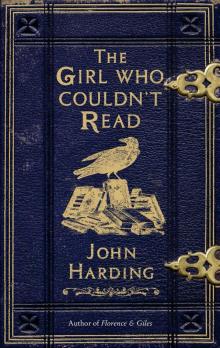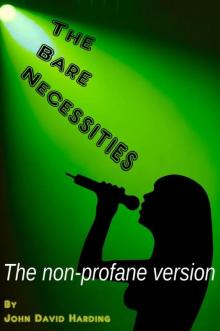- Home
- John Harding
One Big Damn Puzzler
One Big Damn Puzzler Read online
About the Book
On a remote South Pacific island, the struggles of an elderly tribesman to translate Hamlet into local pidgin English are interrupted by the arrival of an unexpected visitor. William Hardt is an obsessive young American lawyer who has come to help. From that moment on, nothing will ever be the same – for what (and who) William finds on the island will challenge both his and our notions about love, life and even death.
Achingly funny and profoundly moving, One Big Damn Puzzler confirms John Harding as one of contemporary fiction’s most entertaining and observant chroniclers of the human condition.
Contents
Cover
Title Page
Dedication
Epigraph
1995
Chapter One
Chapter Two
Chapter Three
Chapter Four
Chapter Five
Chapter Six
Chapter Seven
Chapter Eight
Chapter Nine
Chapter Ten
Chapter Eleven
Chapter Twelve
Chapter Thirteen
Chapter Fourteen
Chapter Fifteen
Chapter Sixteen
Chapter Seventeen
Chapter Eighteen
Chapter Nineteen
Chapter Twenty
Chapter Twenty-One
Chapter Twenty-Two
Chapter Twenty-Three
Chapter Twenty-Four
Chapter Twenty-Five
Chapter Twenty-Six
Chapter Twenty-Seven
Chapter Twenty-Eight
Chapter Twenty-Nine
Chapter Thirty
Chapter Thirty-One
Chapter Thirty-Two
Chapter Thirty-Three
Chapter Thirty-Four
Chapter Thirty-Five
Chapter Thirty-Six
Chapter Thirty-Seven
Chapter Thirty-Eight
Chapter Thirty-Nine
Chapter Forty
Chapter Forty-One
Chapter Forty-Two
Chapter Forty-Three
Chapter Forty-Four
Chapter Forty-Five
Chapter Forty-Six
Chapter Forty-Seven
Chapter Forty-Eight
Chapter Forty-Nine
Chapter Fifty
Chapter Fifty-One
Chapter Fifty-Two
Chapter Fifty-Three
Chapter Fifty-Four
Chapter Fifty-Five
Chapter Fifty-Six
One Year Later
Chapter Fifty-Seven
Chapter Fifty-Eight
Chapter Fifty-Nine
Chapter Sixty
Chapter Sixty-One
Chapter Sixty-Two
Chapter Sixty-Three
Chapter Sixty-Four
Five Years Later
Chapter Sixty-Five
Chapter Sixty-Six
Chapter Sixty-Seven
Chapter Sixty-Eight
Chapter Sixty-Nine
Chapter Seventy
Chapter Seventy-One
Chapter Seventy-Two
Chapter Seventy-Three
Chapter Seventy-Four
Chapter Seventy-Five
Chapter Seventy-Six
Author’s Note
About the Author
Also by John Harding
Copyright
ONE BIG DAMN PUZZLER
John Harding
For Catherine Sutton and Simon Taylor
‘There is nothing either good or bad,
but thinking makes it so.’
Hamlet
1995
ONE
THE DAY THE plane brought the white man was an important one for Managua. He was, as usual, occupied by his translation of Hamlet into language the rest of the tribe would understand, and he could have done without the interruption because this was the day he had set aside to work on the famous soliloquy. As the only islander who could even read, let alone write, Managua felt the burden of his culture upon his shoulders the way he imagined an old turtle bore the weight of its carapace upon its back: it was certainly a secure home, a comfort and a blessing, but at times like this, when he had a tricky scene to write, it was plenty damn heavy too.
Although he later swore about the coming of the white man and the disruption to his work that the resultant excitement caused – not to mention the anxiety to him personally – if truth be told, long before the whirring of the plane’s three propellers stirred the torpid island air, his task was already suffering insufferable disturbances from his wife Lamua who once again had gotten herself into one big sweat about the pig.
Is be or is be not, is be one big damn puzzler
he had written. He read it over again, allowing his lips to move so he could get the feel of how the words would sound, although he dared not permit even a whisper to escape him. The way Lamua was bustling about the hut, moving this and that (as though she might find the pig here! as if you could conceal even a bantam pig in this single, sparsely furnished room!), any sound from him would be jumped upon like a snake by koku-koku and taken as an invitation to conversation.
‘I is tell you now,’ she muttered. ‘I is eat that pig if is be last thing I is do.’
Managua adjusted his spectacles and peered more intently at his Complete Shakespeare, partly by way of showing Lamua that he was ignoring her but also because the print was so bloody damn small. He must see Miss Lucy about some new reading glasses. This pair seemed to be losing all their strength, but then again that was only to be expected; he had had them for a couple of years and they were second-hand when he got them, or rather second-eye, he told himself. He smiled, congratulating himself on his little joke. It was the kind of joke Shakespeare made all the time, which just showed the benefit of reading the great man, and why it would do the islanders good to see Hamlet.
‘You is better not laugh at me now, man,’ snapped Lamua, catching him a cuff round the head as she passed his mat. ‘I is tell you, that bloody pig you is be so fond of is be good as dead.’
Managua squinted at the next line.
‘Whether ’tis nobler in the mind to suffer’ was how Shakespeare had got it. Managua had looked up nobler in the dictionary and realized right away that it was one hard word to translate. The island didn’t have any nobles. There wasn’t even a chief, like he’d heard tell some islands possessed. When something needed to be decided on all the men just crawled into the kassa house and talked it over until everyone was agreed. If it was some little thing they indulged in some kassa first, which generally meant the matter got decided on pretty damn quick since no-one was usually in a mind to argue. If it was something important then they refrained from kassa on the grounds that they needed to think clearly. But if people were thinking clearly in different directions then they might grind a few kassa seeds, mix up the paste and keep spooning it down until they were all so out of their heads that no-one cared enough to argue about what they decided and just wanted to settle the thing plenty fast so they could really get stuck into the kassa. Kassa pretty much ruled out any necessity for nobles.
Lamua was sweeping now and a more disputatious person than Managua might have felt that a disproportionate amount of dust from the hard earth floor was ending up on his books, but he simply brushed it away and got on with his work. Another meaning of noble was ‘lofty’ and cross-referencing in the dictionary told him this meant high or tall. So for the second line Managua had:
Is you be bigger man for put up with
It seemed to him that was what Shakespeare had in mind. And it would be understood, too. Managua was exceptional in height as well as in literary ability; the islanders wer
e not generally big, but rather of small stature, and slim. Bigness impressed them, in body or in mind.
‘I is go enjoy slaughter that pig. I is go drink she blood like Coca-Cola, oh yes,’ Lamua was saying, as though to herself. Although he knew this was just for his benefit, Managua couldn’t help flinching. But then his mind drifted, as he had observed the mind usually will, away from the unpalatable to something pleasurable, in this case the other image conjured up by his wife’s words. Coca-Cola. He hadn’t felt the harsh tickle of its ice-cold bubbles against his throat for some sixteen years, not since the Americans left, all that time ago. It presented a more powerful, as well as a more pleasing picture, than the one of his wife drinking Cordelia’s blood.
‘The slings and arrows of outrageous fortune’
Well this was sure another damn difficult one. The islanders didn’t use slings or bows and arrows and had no knowledge of these things. It was only through his extensive reading that Managua understood what they were. Here they used blowpipes and poison darts – although not at all since the Americans had come and destroyed the only other big village, which had been on the northern end of the island, rendering it permanently uninhabitable by establishing their firing range there and leaving it riddled with mines and unexploded shells when they departed; the sorry remnants of its inhabitants had had no option but to trek south and amalgamate with Managua’s village, or disperse themselves among the various smaller settlements and hamlets scattered across the island, leaving Managua’s people with no-one to fight. He sighed at the thought of it.
‘I is hear you!’ shrilled Lamua. ‘I is hear you make they lovesick sounds for you old pig. What you is think of? You is dream of sneak off and make fug-a-fug with you little pet again?’
‘I is think about Americans,’ said Managua. ‘About how there is be two big villages before they is come.’
This was the wrong thing to say, especially in so wistful a tone. As a child, Lamua had come from the northern village at the time of its evacuation. She lashed out with her broom, knocking his books from the upturned plastic crate Managua used as a desk.
‘I is see you is like they times back. You is like you wife at other end of earth so you is never meet she and you is free for make fug-a-fug with pigs. Oh yes, I is see right through you. You is be thin as water, not thick like Coca-Cola.’
Pleased with this last simile she threw the broom triumphantly into the corner where it normally resided and stormed from the hut.
The trouble was, thought Managua, as he rescued the books from the floor and restored them to his desk top, that while you could suffer, or put up with, slings and arrows, however painful, the same could not be said of poison darts of which the tips had been dipped in the venom of the terrada, the green shoestring snake. Once it was in your bloodstream, you had approximately thirty seconds to live. There was no known antidote. It wasn’t something you endured, exactly. Enduring had to last more than half a minute. And why would anyone want to fire an unpoisoned dart at someone? What would be the point? It was scarcely likely to do any damage without the venom. In a way, this was what Managua liked about translating Shakespeare. The Bard set you a problem and the pleasure was in pitting your mind against his to find a way around it.
He thought about other weapons the islanders used. Until the coming of the black bantam pigs, imported by the British shortly after World War II, they had not been hunters. Their main source of protein was fish which they caught with nets. You couldn’t suffer from nets. Other than fish they ate the fruit and nuts that grew plentifully on the island and the maize, yams and vegetables they cultivated in their gardens. Of course if they came across a stranded turtle or a snake they would eat that too, and the occasional waterfowl, which they caught with snares, but other than these there was nothing worth hunting. It was taboo to kill any of the island’s fourteen species of monkey, their resemblance to the islanders being considered too close for comfort. Eating them would have seemed like cannibalism, something else the islanders eschewed.
The black bantam pigs, which were no larger than a small to medium-sized dog, had been brought by the British from another island or group of islands, New Guinea perhaps, Managua couldn’t now recall. The idea had been to domesticate them to save the British having to import quite so much meat. The pigs were known to survive well in jungle conditions, they would eat anything and their flesh was succulent. Unfortunately the British had neglected to ask themselves why the pigs had not been domesticated wherever it was they came from. The answer to that unasked question was soon made clear. The pigs were not only vicious, with a tendency to bite with their surprisingly sharp teeth anyone who came near them, they were also adept escapers. It was impossible to keep them contained. They gnawed through bamboo fences or burrowed under them. When barbed wire was tried, they simply walked through it, their tough hides impervious to the barbs.
The British left, their fifty years of intermittent attempts to establish a base upon the island abandoned. They bequeathed the islanders their language, which various missionaries had taught the natives, and the black bantam pigs. They couldn’t have taken the pigs even if they’d wanted to, as the animals had all long ago escaped and turned feral, if, that is, they could ever have been said to be anything but feral. So the islanders had taken to hunting them. At first they had used the only deadly weapons they were familiar with, poison darts. The flaw with this soon became obvious when a number of islanders died after feasting upon the kills. The terrada venom had spread throughout the pigs’ bodies and was so potent that even a small piece of pig meat proved fatal. Thereafter the natives dug pits and filled the bottoms of them with pointed bamboo stakes. Any pigs that weren’t killed by being impaled on the stakes were finished off with wooden clubs. After he had ruminated on this for some time, all the while ignoring the excited shouts blown along to the village on the breeze from the landing beach, Managua finally settled on the line:
Clubs and bamboo pits of real damn bad luck
He wasn’t quite happy with this. Bamboo pits ought to come first. After all, you didn’t use the clubs until after the pig had fallen into the pit. But the trouble was it just didn’t sound as good the other way round. Never mind, it would have to do for now. He could go back to it later.
The cries were getting louder, as though people were running along the shore from the landing beach, a mile or so away, to the village. He hoped there wasn’t going to be a lot of shouting here. It was bound to be over something trivial. Maybe the agent had sent them a case of Coca-Cola. People had gone berserk the last time that had happened, a year or so ago. It was all anyone could talk about although the stuff had got itself drunk pretty fast; Managua certainly hadn’t seen any of it.
‘Or to take arms against a sea of troubles’
Now this was, in Managua’s opinion, a rare example of a piece of poor writing by Shakespeare. For how could you take arms against a sea? What, attack the ocean with poison darts? Or even slings and arrows? Club it to death? The image was ridiculous. Shakespeare must have been having an uncharacteristic bad moment. Maybe he had lost his concentration because his wife was looking for a pig. The idea of fighting against the sea reminded Managua of that mad British king who had ordered the tide to turn. Typical loony British! Worse than their homicidal pigs! You couldn’t fight the sea, as Managua well knew. It was eating up the island and would eventually swallow them all but there was nothing anyone could do about it. And then, somehow, as it always did when he was writing, if he just kept faith and trusted the process, the answer came to him ready-made and he hastened to scrawl the end of the paragraph.
He read through what he’d got so far, trying to blot out the cries that were growing closer.
Is be, or is be not, is be one big damn puzzler:
Is you be bigger man for put up with
Clubs and bamboo pits of real damn bad luck,
Or, is take blowpipes for fight herd of pigs
And is by use of snakebite, end they?
It worried him a little that he had used the word damn twice, but on the other hand it was a good word and it was surely better to use a good word twice than substitute one use with a bad one. He was just mulling this over when Tigua burst into the hut, running so fast he was almost unable to stop and only just managed to avoid colliding with Managua’s desk.
Tigua was so out of breath he could scarcely speak. ‘Managua, Managua,’ he panted out at last, ‘you is must come landing beach. Plane is bring white man!’
Even Managua, who liked to pretend he was above the petty excitements of the rest of the tribe, was startled by this. ‘White man?’
‘Yes,’ said Tigua, fiddling with his false breasts and reaching under his dress to adjust the shoulder strap of his bra. ‘White face and yellow hair. He is stand in door of plane for wait boat. I is see he plain as I is see you. You is must come. Everyone is say come get you.’
Managua stirred himself. ‘Bring me my leg.’
Tigua fetched the artificial leg that was leaning against the wall of the hut and waited anxiously while Managua strapped it to his stump.
‘Help me up,’ said Managua.
‘Of course,’ said Tigua, bending low and offering his shoulder for Managua to pull himself up by.
Managua limped towards the door of the hut, then realized Tigua hadn’t moved. ‘Come on then, you is say there is be big damn hurry. What you is wait for?’
‘I is just wonder,’ said Tigua, ‘you is happen for know where Lamua is keep she lip paint?’
TWO
WILLIAM HARDT STEPPED gingerly across the threshold of the flying boat’s door. Even though the plane had landed a fair distance out into the bay, way beyond where the big rollers formed and broke, there was still a significant swell to the sea, rocking the keel of the aircraft so that it was difficult to keep his balance without holding onto the door jambs. The pilot had hooked some steps over the bottom lip of the doorway and down the side of the plane. William stood on the top step. Below, tossing about in the waves, he could see a large dugout canoe, with a single outrigger float to one side. All around, the ocean was alive with dozens of other craft – dugouts and canoes of all sizes, some with outriggers, others with sails, some with both, some with neither. The whole population of the island seemed to have turned out to meet him, and indeed this wasn’t far from the truth, although they were not there to meet him since they hadn’t had any idea he was coming; the monthly visit of the plane was enough in itself. The first thing he noticed was that they were all almost naked, the mass of light brown flesh scarcely dotted with clothing. The women were in short grass skirts, their bare breasts bobbing around with the movement of the boats in which they sat or, more commonly, stood, the better to get a look at him, he supposed. The men wore only what appeared to be a piece of leaf, held over their genitals by a string which travelled between their legs and buttocks to another around the waist, like a stripper’s G-string. They were of every age, old men and women, small children, teenage boys and young women whose nipples peeped between the leis, the garlands of richly coloured flowers of welcome they wore around their necks, presumably for the pilot as they couldn’t be for him. All seemed to be pointing up to him and saying the same thing: ‘Gwanga, gwanga’, chattering away like the monkeys whose lives they so respected, although of course William Hardt knew nothing of that yet. He had done his research on the island, but none of it had had to do with the culture or customs of its people. His interest in the place lay elsewhere.

 Florence and Giles
Florence and Giles One Big Damn Puzzler
One Big Damn Puzzler The Girl Who Couldn't Read
The Girl Who Couldn't Read The Bare Necessities (Non-Profane Edition)
The Bare Necessities (Non-Profane Edition)